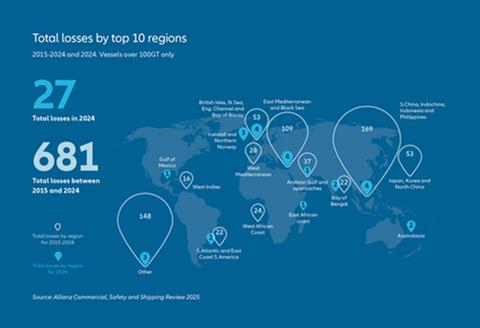Allianz report highlights rise in shadow fleet risks, US-China trade conflict, and mis-declared cargo concerns—despite record low in total ship losses.

The shipping industry is facing mounting geopolitical and operational risks, even as overall safety records improve, according to Allianz Commercial’s annual Safety and Shipping Review 2025.
The global marine insurer warns that escalating trade tensions, shadow fleet operations and environmental hazards are reshaping risks across the sector.
Although only 27 large ships were lost in 2024—the lowest figure ever recorded and a more than 20% drop from 2023—Allianz cautioned that traditional safety progress is being counterbalanced by newer threats.
“The relevance of political risk and conflict as a potential cause of maritime loss is increasing with heightened geopolitical tensions,” said Captain Rahul Khanna, global head of marine risk consulting at Allianz Commercial.
“Total losses from traditional causes may have reduced over time, but we could be in a position where this positive trend is potentially offset by war and other political-related exposures,” he added.
“As an industry, we are in a better position with regards to traditional risks, but there is a renewed focus on geopolitical risks.”
Trade friction and shadow fleet expansion
The Allianz report cited the continuing impact of the US-China trade dispute and the emergence of a vast shadow fleet as key disruptors to maritime stability.
Tariffs on Chinese goods peaked at 145% before a temporary 90-day easing agreement was reached. But by mid-April 2025, an estimated 18% of global maritime trade was subject to tariffs—up from 4% in March—prompting “dramatic declines in shipments” after so-called Liberation Day announcements.
Meanwhile, the shadow fleet, consisting largely of older tankers transporting sanctioned cargo such as Russian oil, has grown to represent approximately 17% of the global tanker fleet. Allianz estimates nearly 600 tankers are operating under these opaque arrangements.
“Although recent sanctions are making it harder for these vessels to trade, the shadow fleet continues to pose a serious risk to maritime safety and the environment,” said Justus Heinrich, global product leader for marine hull at Allianz Commercial.
“Many are likely to be older vessels that are poorly maintained and inadequately insured. In case of an oil spill involving a shadow fleet tanker, cleanup costs could be as much as $1.6bn,” Heinrich warned.
Fires, lithium-ion cargo and total loss trends
Traditional perils have not disappeared. Fires, particularly on container and roll-on roll-off vessels, remain a key concern. Fire-related incidents rose to a decade high of 250 in 2024, with approximately 30% involving container, cargo, or ro-ro ships.
Although the number of fire-related total losses held steady at seven, Allianz has recorded more than 100 total losses due to fire over the past 10 years. The mis-declaration of cargo continues to be a major contributor, now compounded by the rising volume of lithium-ion batteries in global trade.
“There is little doubt the shipping industry is becoming more resilient against the risks associated with large vessels, although we can by no means say they are under control,” said Khanna.
“However, only 27 total losses during 2024 underlines the positive trend. To put this into perspective: there are over 100,000 ships (100GT+) in the global fleet.”
Still, Khanna stressed the uncertainty of the road ahead. “Cyber-attacks and GPS interferences are increasing. Ceasefires have raised hopes, but the Red Sea security threat and supply chain disruption will likely remain. Meanwhile, the green transition requires much work.”
“The coming years will be decisive and will determine the path of the sector and global trade.”










No comments yet